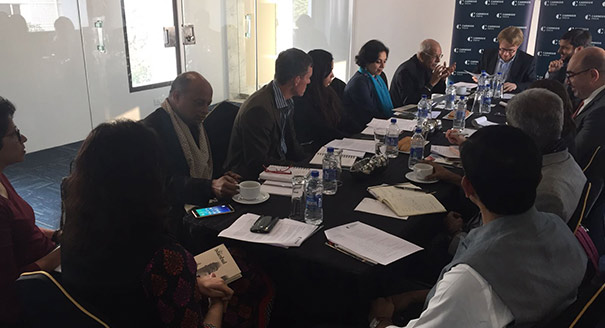{
"authors": [
"Nicolas Blarel",
"Ranjit Gupta"
],
"type": "event",
"centerAffiliationAll": "",
"centers": [
"Carnegie Endowment for International Peace",
"Carnegie India"
],
"collections": [],
"englishNewsletterAll": "",
"nonEnglishNewsletterAll": "",
"primaryCenter": "Carnegie India",
"programAffiliation": "",
"programs": [],
"projects": [],
"regions": [
"Middle East",
"Iran",
"Bahrain",
"United Arab Emirates",
"South Asia",
"India"
],
"topics": [
"Foreign Policy"
]
}
India’s Security Relations With the Gulf States
Tue, December 13th, 2016
New Delhi
Carnegie India hosted a private roundtable discussion on India’s security relations with the Gulf States, and the manner in which these ties have evolved since the 1920s. The discussion was lead by Dr. Nicolas Blarel, assistant professor of International Relations at Leiden University, and chaired by Ambassador (retd.) Ranjit Gupta, former head of the West Asia and North Africa division in the Ministry of External Affairs and member of the National Security Advisory Board. This discussion took place in light of the recent invitation extended to the Crown Prince of Abu Dhabi to be India’s chief guest on Republic Day, and Prime Minister Modi’s frequent and successive visits to the United Arab Emirates, Saudi Arabia, Iran, and Qatar.
Discussion Highlights
- Years of Strategic Neglect: Participants argued that due to historical imperatives at crucial inflection points in India’s recent history, India had forsaken many opportunities to impact the regional security order. During the British Raj, it was British India that was considered the main security actor in the Gulf. After independence, however, security and economic policies were more inward-looking, and a lack of resources meant that India deliberately abstained from involvement in the region. Later, India’s support for Egypt alienated the Gulf States, and their support for Pakistan during the 1971 war further strained relations. While over recent decades India has developed good relations and trade ties with the Gulf states, and a large Indian diaspora has settled there, India’s interaction with the region has been relatively free of strategic and political calculation, participants concluded.
- India’s Future Role in the Region: Participants noted that two schools of thought on India’s future security role in the region have emerged recently. One is that, as India’s material capacities grow, its sphere of influence will extend as well. The other is more cautious, contending that India should not intervene in the fluid and uncertain geopolitics of the region, and should instead exercise studied ambiguity and a culture of strategic restraint. Against these two options, participants proposed a policy of gradual change. They argued that there had been no hugely significant change in Indian interests in the Gulf region, and that this continuity could be attributed to the fact that Indian elites had always considered the Gulf States to be part of India’s immediate neighborhood. What varied over time were not strategic interests, participants contended, but India’s choice of strategic instruments, which changed and continue to change depending on India’s actual and perceived capacities of power projection.
- Nature of Engagement: Participants addressed the seeming dichotomy inherent in assertions that India lacks a strategic relationship with the Gulf region, and that India has, in its interactions with the region, been able to successfully manage its complex geopolitics, by questioning if the balancing act was a conscious strategy. Further, participants discussed the extent to which India should engage with the Gulf. They argued that it should be careful to keep engagement measured and not get pulled in to the power vacuum left by the United States, since India does not have the resources to be a successor to the United States and emulate its commitments. It was suggested that India could potentially play a major role as part of a collective Asian effort. They also remarked on creating opportunities for cooperation with Gulf states that shared concerns over terrorism and ideologies such as Wahhabism, and asserted that the growth of the self-proclaimed Islamic State has created one such opportunity for India to deliver security assistance, on the basis of which security partnerships and relationship can evolve further.
This event summary was prepared by Tanya Rohatgi, an intern at Carnegie India.
Carnegie does not take institutional positions on public policy issues; the views represented herein are those of the author(s) and do not necessarily reflect the views of Carnegie, its staff, or its trustees.
Event Speakers
Nicolas Blarel
Nicolas Blarel is an assistant professor of international relations at the Institute of Political Science at Leiden University.
Ranjit Gupta